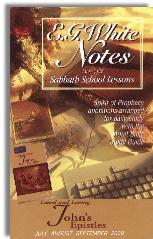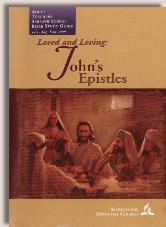|
||||||||||||||
Commentary on "Important Themes in 1 John"
Day 1: Sabbath Afternoon, September 5, 2009
Overview
This week the author begins with a reference to the tragic events of September 11, 2001. The author suggests that while many of the events of that day were almost exclusively negative, the destruction did not go without a positive side. The acceptance of moral relativism by many in the world also began to crumble with the fall of the twin towers.
Moral relativism is the view that ethical standards, morality, and positions of right or wrong are culturally based and therefore subject to a person's individual choice. We can all decide what is right for ourselves. You decide what's right for you, and I'll decide what's right for me. Moral relativism says, "It's true for me, if I believe it."
The author uses this illustration to point the reader into the study of 1 John and how the major themes of the book answer the questions of the nature of truth, “which always forms the foundation of morality.”
Problems
Moral relativism is not really a problem for any of us. Philosopher’s think it is, and others buy into the idea, but in reality it means nothing. We all know what is right and wrong. Paul in the book of Romans (chapter 1, verses 18 through 32) is very clear about this. The problem is the choices we make. We like to trick ourselves to believe that we are okay in what we do. Moral relativism is simply a crutch or excuse to justify our unrighteous and sinful nature.
The problem is the choices we make before being reborn in Christ Jesus are always sinful because we are all sinners (Romans 3:10-18). Every part of us is sinful. This only changes when we are called by God to accept His son Jesus Christ as savior and our soul is reborn by having the Holy Spirit dwell within us. But our flesh is still sinful, and it wars against are reborn spirit (Romans 7:18-20).
The week at a glance is also quite misleading when the author asks the question “What is the only basis of our salvation?” Any Christian knows that the only basis of our salvation is acceptance of Jesus as our savior (Romans 10:9). For an Adventist it is this plus the addition of the Ten Commandments that is the basis of salvation. Belief in Jesus is simply part of the equation for the SDA. For the true Christian, Jesus is the entire equation.
Summary
- We all know the truth because God has made it plain to us, but we suppress it because of our unrighteousness. (Romans 1:18-32)
- We will continue to make sinful choices in our life until we accept Jesus Christ as our savior.
- ONLY the belief in Jesus gives our reborn souls freedom from sin, even though our flesh still desires sin. (Romans 7:18-20)
Copyright 2009 BibleStudiesForAdventists.com. All rights reserved. Revised September 5, 2009. This website is published by Life Assurance Ministries, Glendale, Arizona, USA, the publisher of Proclamation! Magazine. Contact email: BibleStudiesForAdventists@gmail.com.
The Sabbath School Bible Study Guide and the corresponding E.G. White Notes are published by Pacific Press Publishing Association, which is owned and operated by the Seventh-day Adventist church. The current quarter's editions are pictured above.
Official Adventist Resources
Standard Edition Study Guide Week 11
Teacher's Edition Study Guide Week 11
Easy Reading Edition Study Guide Week 11
Search the Complete Published Ellen G. White Writings


